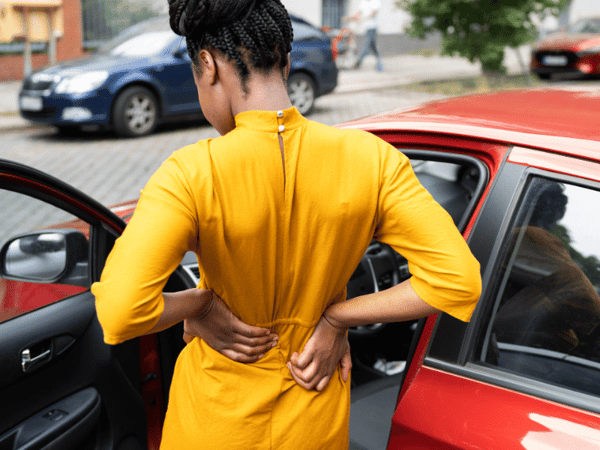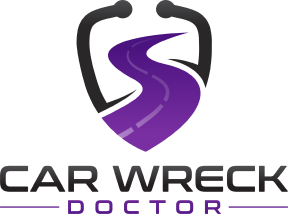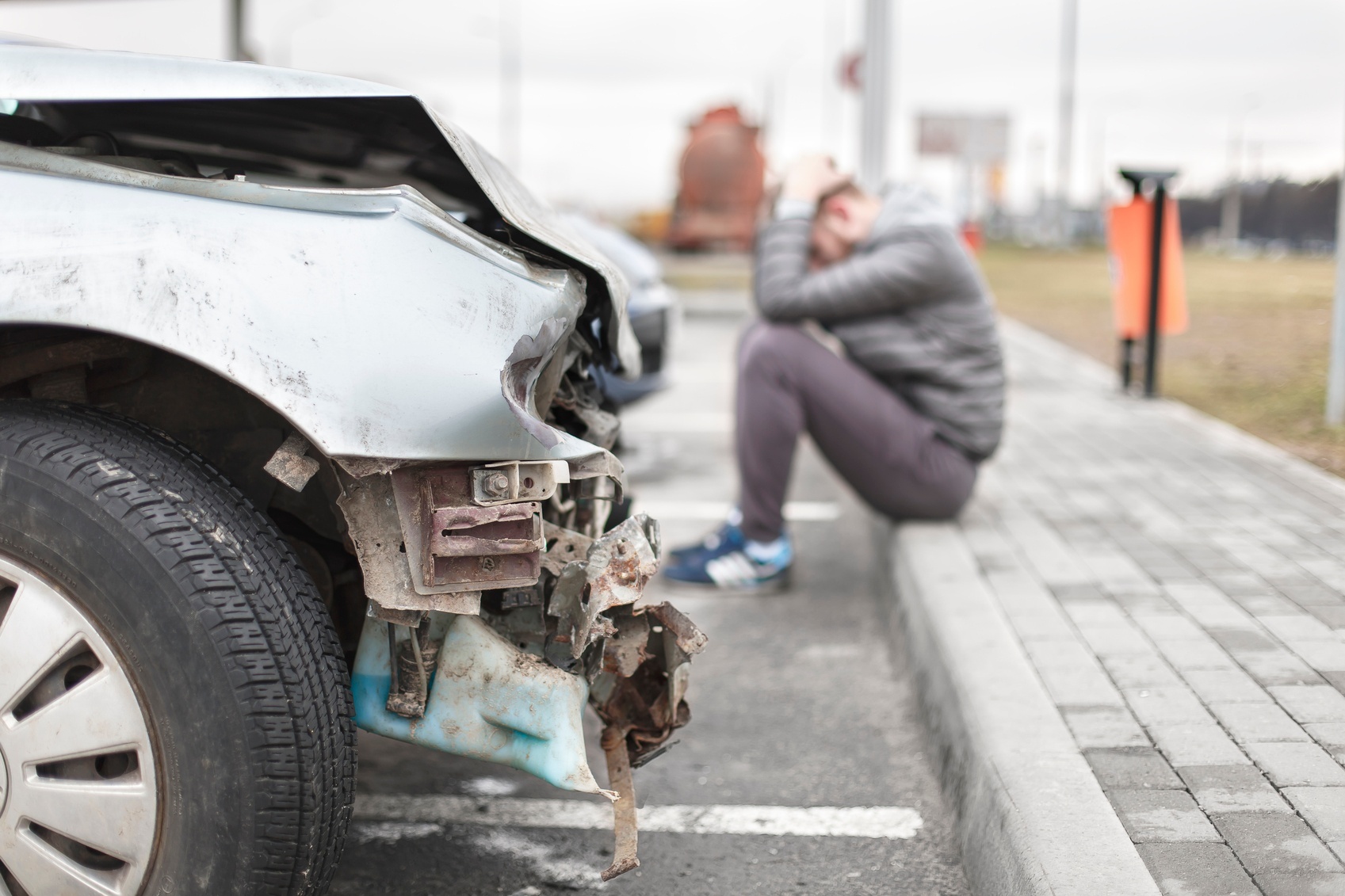If you were recently involved in a motor vehicle accident, you likely felt rattled and shaken up, but maybe you walked away from the accident scene feeling unharmed.
This occurrence happens to many people, but it doesn't always mean you've made it out injury-free.
Many auto accident injuries cause delayed pain, delayed symptoms, and delayed injuries.
Following an auto accident, even if you feel fine immediately afterward, you need to monitor yourself for several weeks for pain and other injury symptoms.
The article below will talk about a few common delayed accident injuries.
Have other questions about treatment following a car accident? Read our blog post: "The Top 5 Things You Need To Ask Your Car Accident Doctor."
Table of Contents
- How Long After a Car Accident Can Injuries Appear?
- Whiplash
- Concussion
- Spine Injuries
- Internal Bleeding
- Soft Tissue Injuries
- Depression, Anxiety, or PTSD
- Blood Clots
- Car Wreck Doctor
How Long After a Car Accident Can Injuries Appear?
Symptoms and injuries from a car accident can take hours, days, or even weeks to present themselves after the crash.
One of the most common reasons for delayed injury symptoms after an accident is the enormous surge of adrenaline and endorphins our bodies experience during a traumatic event like an auto accident.
This adrenaline release can mask feelings of pain directly after an accident.
Everyone will react differently to the trauma of a car accident, and there's no definitive reason why some people feel immediate symptoms. In contrast, others experience delayed pain and symptoms.
But it's important to remember that even if you feel fine after a car crash, you're not out of the woods yet.
You will need to continuously monitor yourself in the days and weeks following the accident. If you notice any new pain or symptoms, you should contact an accident doctor right away.
For those who have been in an accident, here are some more common injuries that can appear several days later.

Whiplash
Whiplash is a neck injury caused by the back-and-forth of your head and neck that often occurs during an accident, especially a rear-end collision.
You might also experience blurred vision or dizziness that accompanies a concussion, a common injury.
Even numbness, weakness, or immobility in your arms or legs could be a sign that you have whiplash.
Concussion
A concussion can occur when your brain hits the inside of your skull.
You don't actually have to hit your head against something to get a concussion.
It can also happen from a sudden, forceful change in motion that slams your brain against your skull.
Depending on the severity of your concussion, you may experience a wide range of symptoms.
The most common symptoms are:
- Headaches
- Dizziness
- Changes in appetite or sleep habits
- Light sensitivity
- Sound sensitivity
- Disorientation
- Mood swings
Concussions are often hard to pinpoint, especially if there is no outward indication of an injury.
It can also be life-threatening, so prompt medical treatment is critical.
This danger is why it is essential for car accident victims to seek medical attention even when they think their injuries are minimal.
In addition to concussions, you may also suffer traumatic brain injuries.
A traumatic brain injury (TBI), similar to a concussion, occurs when a sudden trauma causes damage to the brain.
TBIs can result when your head suddenly and violently hits an object or when an object pierces the skull and enters brain tissue.
If left untreated, these can severely affect your quality of life and lead to death in severe cases.

Spine Injuries
The impact of a car accident can lead to a back or spinal cord injury.This misplacement leads to pinched nerve pain, numbness, or a tingling sensation.
Back pain can often limit mobility, so consult with a doctor to see what treatment options are suitable for you before it can get worse.
Internal Bleeding
Car manufacturers design seat belts to save our lives. As a result, one should always utilize them.
However, the force of being thrown against it could cause internal injuries.
Seat belts often deliver blunt force, especially in high-impact accidents, and cause internal injury to your kidneys, lungs, and heart.
Your seat belt can also crack one of your ribs or injure other tissues.
A few signs that you may have internal bleeding are:
- Abdominal pain
- Blood in urine or stool
- Coughing up or vomiting blood
- Difficulty breathing
- Bruising on your thorax
- Leg weakness
- Dizziness
Soft Tissue Injuries
Sprains, strains, and contusions are common auto injuries.
They occur when your soft tissues are stretched, torn, or otherwise injured during a car accident.
Common symptoms include pain, swelling, tenderness, deep bruising, and muscle spasms.
Another common symptom of a soft tissue injury is a reduced range of motion.

Depression, Anxiety, or PTSD
Traumatic events like car accidents can significantly impact your mental and emotional well-being.
Mental health disorders like anxiety, depression, and post-traumatic stress disorder (PTSD) are not uncommon after car accidents.
These disorders and their associated symptoms can present weeks, months, or even years after the initial traumatic event.
Blood Clots
Blood clots can also develop due to another common car accident injury.
Blood clots themselves are not a big deal because the body often takes care of them themselves, but if they reach the heart or the brain, they can cause severe injury or even death.
Headaches are a common indication of a blood clot in the brain.
They can also accompany other signs of a concussion or brain trauma, but not always.
These symptoms can take a few days to develop.
Car Wreck Doctor
Just because you could walk away from a car accident doesn't mean you are out of the woods yet.
You could have sustained several injuries that won't manifest for several hours or days after the accident.
Be mindful of the symptoms above, and visit your doctor if you develop any of them.
Car Wreck Doctor has a mission to connect accident victims with a professional Medical Doctor or Chiropractor that can help you after your crash.
They will also refer you to an experienced personal injury attorney that can help you win your personal injury claim.
Car Wreck doctor will help you through the entire process, allowing you to focus on recovering from your injuries.
Contact Car Wreck Doctor today by clicking the button below.


